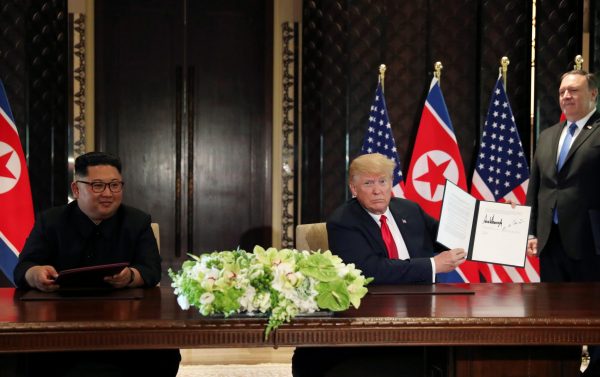Beijing’s ‘winner’ status began to emerge in the March–May period of this year as inter-Korean relations improved with the ‘Olympic detente’, culminating in the inaugural Moon–Kim summit. North Korean leader Kim Jong-un has now met with Chinese leader Xi Jinping on multiple occasions and their evident coordination vis-a-vis the United States and South Korea demonstrates a thaw in the previously chilly relations between the two erstwhile allies. The conciliatory lead-up to the US–North Korea summit also cleared the path for Beijing to loosen sanctions against Pyongyang, which China had been uncomfortable with imposing to begin with. Indeed, ‘maximum pressure’ is now dead letter.
The Trump–Kim meeting in Singapore and the Sentosa Declaration that capped it are developments that benefit China. The United States and North Korea successfully reduced tensions and established a pathway for continuing diplomacy intended to improve long-term US–North Korea ties, convert the Korean War armistice into a lasting and robust peace regime, and perhaps achieve eventual denuclearisation (possibly spanning everything from Korean Peninsula arms control to outright North Korean denuclearisation). The reduction in regional tensions and threat of kinetic conflict in China’s neighbourhood are trends that clearly fall in Beijing’s favour.
Trump also announced the cessation of US–South Korea joint military exercises and the possible future withdrawal of US troops from the Peninsula during the post-summit press conference. Both measures are positive for China. They signal a gradual dissolution of the US–South Korea military alliance, which is a long-standing strategic goal of the Chinese leadership. Meanwhile, Japan — a US ally and China’s regional competitor — was excluded from a serious role in Korean Peninsula diplomacy, underscoring its weakened regional position.
It is tempting at this point for Chinese leaders to adopt a hands-off approach and allow the Trump administration to continue eroding relative US power in Northeast Asia through its own diplomatic efforts with North Korea. But this would be a mistake. A Beijing victory lap is premature for several reasons.
First, although in the short-term it may produce outcomes that favour Beijing and Pyongyang, the Trump administration’s dealings with North Korea should worry Chinese leaders. US expectations for North Korean denuclearisation are the main concern. As nearly all experts have hectored, the Sentosa Declaration is thin on details and does not even provide a shared definition of denuclearisation.
Consequently, there is no foundation on which denuclearisation can be meaningfully pursued. The Trump administration insists that the North Korean leadership has verbally assured that it shares Washington’s understanding of the concept. But US Secretary of State Mike Pompeo’s July trip to Pyongyang, which was intended to advance denuclearisation, was a humiliating debacle. Pompeo left North Korea empty-handed — no denuclearisation definition or timetable, or listing of nuclear assets — and landed in Washington to harsh criticism in North Korean state media of his visit and convincing reports that North Korea is expanding and accelerating its nuclear weapons program.
This is the behaviour of a regime uninterested in denuclearisation and likely deliberately misleading the Trump administration. For China, two risks emerge from this situation. The major risk is that eventually Trump will feel aggrieved, reverse course and give the North Korea nuclear brief to hardliners such as US National Security Advisor John Bolton who welcomes diplomatic failure as a prelude to kinetic attack. The potential for escalation is significant and China should work vigilantly to prevent this.
A second, less likely risk scenario arises from Trump’s unconventional presidency. It is possible that if Trump realises that denuclearisation is likely to fail, he may not attack Pyongyang but rather push for a deal that accepts North Korea as a nuclear state. China already has difficulty dealing with its rebarbative allies in Pyongyang — managing its relationship with a recognised nuclear North Korea, whose leaders resent their dependence on China, would become a serious headache.
An even more provocative scenario involves a deal in which North Korea moves out of China’s orbit and towards the United States. This is difficult to imagine. But Trump is nothing if not disruptive. Few experts thought 18 months ago that the US president would have a better relationship with Xi Jinping and Kim Jong-un than with Angela Merkel and Justin Trudeau.
Second, China should avoid a celebratory lap on the Korean Peninsula because the issue represents only one part of Beijing’s larger strategic design. China may want to achieve a strategic diplomatic victory on the Peninsula, but it should not compromise its other vital interests to do so. A partial rather than total diplomatic win on the Korean Peninsula would behove China. A humiliated United States would be more likely to compensate for a diplomatic defeat on the Peninsula by exerting pressure on Taiwan, the South China Sea, global and bilateral trade relations, or global institutional leadership.
Relative power transition in East Asia favours China. But as the expression goes: pigs get fat, while hogs get slaughtered. Beijing should be prudent in balancing its strategic priorities, even if that means calibrating its involvement on the Korean Peninsula so that the United States remains a wary partner rather than a humiliated adversary.
Mason Richey is Associate Professor at the Graduate School of International and Area Studies, Hankuk University of Foreign Studies (Seoul, South Korea).

